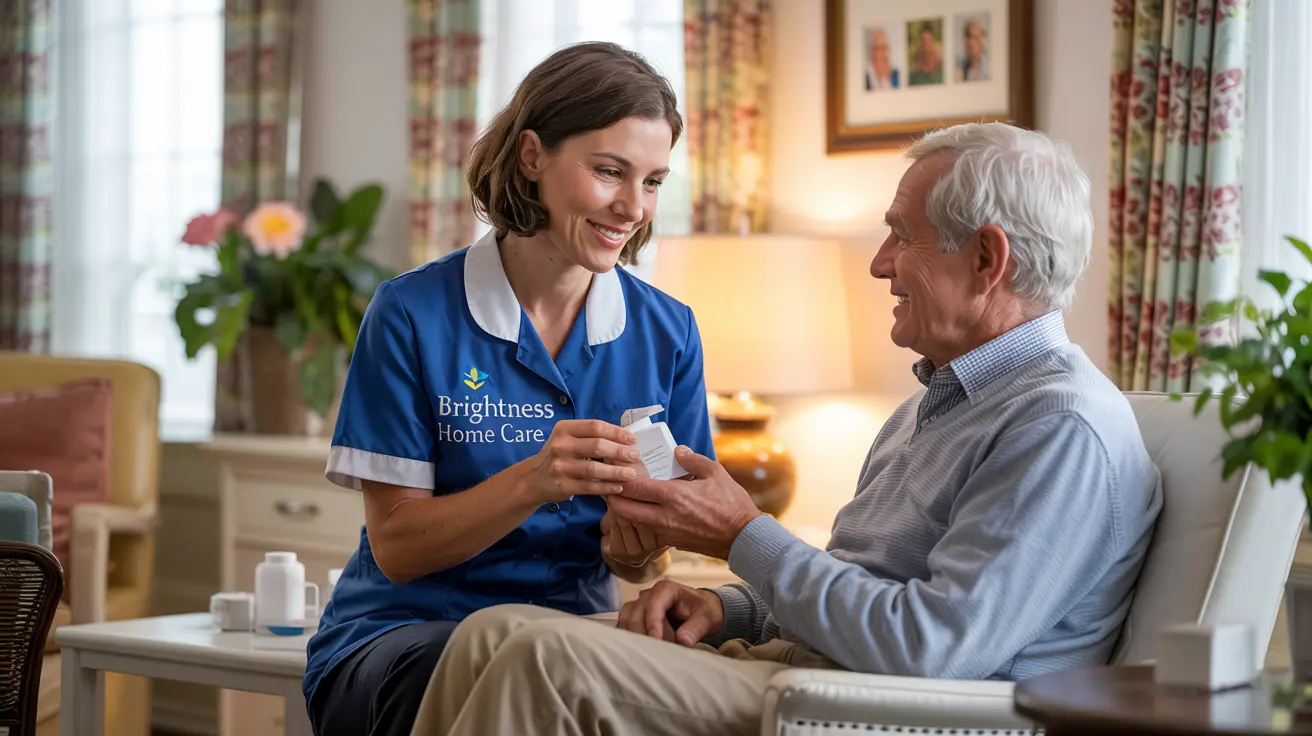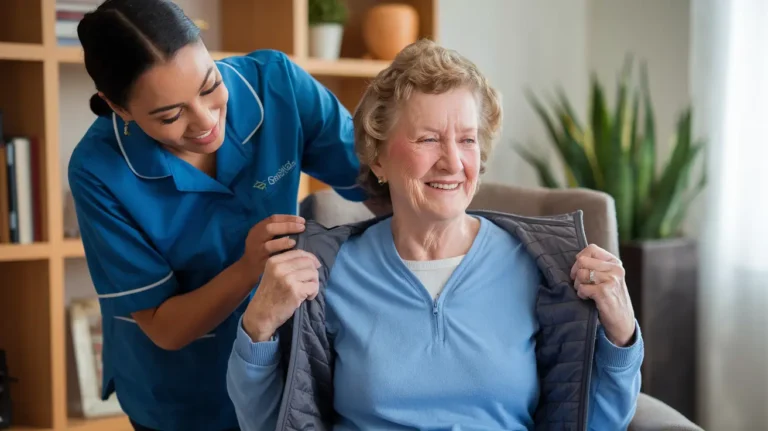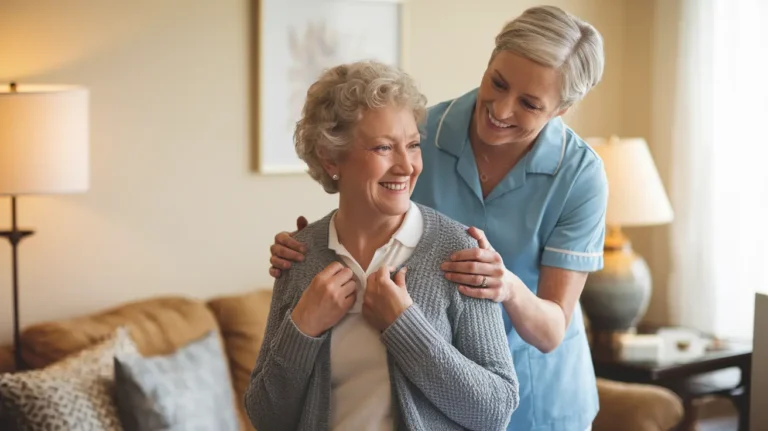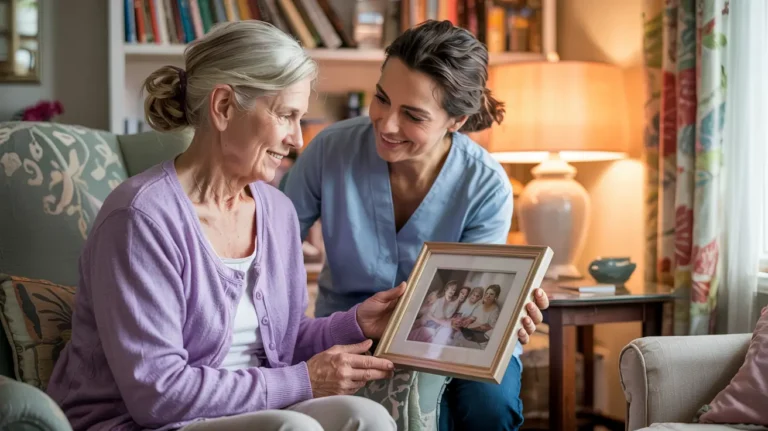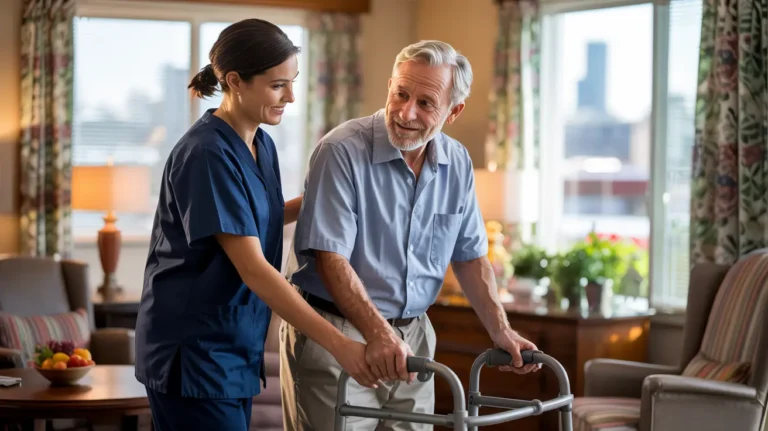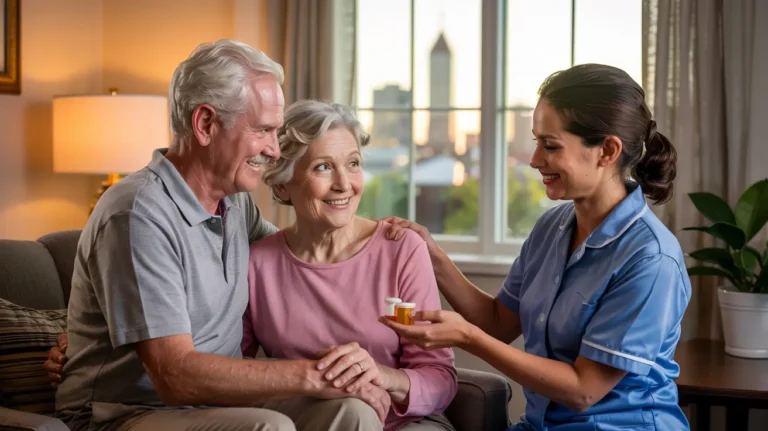Essential Memory Care Safety Guidelines in Indianapolis: A Caregiver’s Perspective
Did you know that over 6 million Americans are living with Alzheimer’s disease, and that number is expected to triple by 2050? I certainly didn’t realize the magnitude until I began working with memory care patients. The statistics honestly shocked me! When it comes to caring for someone with memory challenges, safety isn’t just a concern—it’s absolutely paramount.
I’ve seen firsthand how quickly a moment of confusion can lead to a dangerous situation. After years of working with families across Indianapolis, I’ve gathered some hard-earned wisdom about creating safer environments for those with memory impairments. Trust me, being proactive rather than reactive can make all the difference!
At Brightness Home Care LLC, we’ve developed specialized approaches to memory care safety that address the unique challenges faced by Indianapolis families. Whether you’re caring for a parent with early-stage dementia or a spouse with advanced Alzheimer’s, this guide will help you navigate the complex world of memory care safety with greater confidence.
Understanding Memory Care Safety Challenges in Indianapolis
Let me tell you, memory care safety is a whole different ball game compared to regular elder care. I remember working with my first client with dementia—I thought I was prepared until she tried to go outside in her nightgown during a February snowstorm! That’s when I realized just how unique these safety challenges can be.
Indianapolis presents some specific challenges for memory care. Our seasonal weather swings from scorching summers to icy winters create changing safety concerns throughout the year. Those beautiful but steep hills in neighborhoods like Meridian-Kessler can become treacherous for someone with spatial awareness issues.
The statistics are pretty eye-opening too. About 60% of people with dementia will wander at least once, and many will do so repeatedly. In my experience working across Indianapolis neighborhoods, homes with open floor plans tend to be safer for supervision, while multi-level houses often need more extensive modifications.
Warning signs that your loved one needs enhanced safety measures aren’t always obvious. Have you noticed burn marks on pots and pans? Finding clothes in unusual places? These seemingly small things were actually how one family I worked with first realized their father needed additional support. Don’t ignore these subtle clues!
The urban environment of Indianapolis creates its own set of challenges. Busy streets, construction areas, and the constant activity can be overwhelming and disorienting for someone with memory impairments. I’ve worked with families near downtown who’ve had to be particularly vigilant about exit security compared to those in quieter neighborhoods like Geist.
Creating a Safe Physical Environment for Memory Care
I’ll never forget the time I walked into a new client’s home and counted seven potential fall hazards in the first room alone! Creating a safe physical environment is absolutely crucial, and honestly, it’s often the easiest place to start making meaningful changes.
First thing’s first—you need a comprehensive home assessment. I always start with a room-by-room safety check, looking for trip hazards, access issues, and potential dangers. Throw rugs are the worst offenders! I can’t tell you how many falls I’ve seen caused by those innocent-looking decorative rugs. Get rid of them immediately!
Bathrooms and kitchens need special attention because they combine two dangerous elements: water and hard surfaces. In bathrooms, grab bars aren’t just helpful—they’re essential. Don’t make the mistake I did with my own grandmother, waiting until after a fall to install them. And those non-slip adhesive strips for the tub? Worth every penny.
For kitchens, I’ve found that automatic shut-off devices for stoves are lifesavers. One family I worked with in Pike Township was constantly worried about mom leaving the stove on until we installed an automatic shut-off timer. Their stress levels dropped immediately!
The good news is that many safety modifications are surprisingly affordable. You don’t have to break the bank to make significant improvements. Standard doorknob covers run about $10-15, while basic motion sensors can be found for under $30. These small investments can prevent major accidents.
At Brightness Home Care LLC, located at 4911 West 38th Street in Indianapolis, our team conducts detailed home safety evaluations as part of our memory care services. We look for things homeowners often miss, like water temperature settings that could cause scalding or lighting issues that create confusing shadows. Sometimes the smallest changes make the biggest difference in preventing accidents.
Preventing Wandering: Indianapolis-Specific Strategies
Wandering scared the daylights out of me the first time I experienced it with a client. One minute we were having lunch, and the next, she was halfway down the street in her slippers! Wandering is one of the most dangerous behaviors associated with memory impairments, especially in a city like Indianapolis with its busy streets and extreme seasonal temperatures.
The warning signs of wandering tendency aren’t always obvious. Restlessness, pacing, repetitive movements, and talking about going to work or “going home” (even when they are home) can all indicate wandering risk. I had one client who would start collecting his keys and wallet—that was his tell that he was planning to leave.
Door and window security is your first line of defense. I’m a big fan of door alarms, especially the ones that can be programmed with different tones. Double-sided deadbolts can be helpful, but remember that they could be dangerous in emergency situations like fires. Always have a safety plan!
GPS technology has been a game-changer for families I’ve worked with. There are now wearable options that look like regular watches or pendants that don’t stigmatize the person wearing them. One family I worked with in Carmel got tremendous peace of mind from a simple shoe insert GPS tracker—their dad never knew it was there, but they could find him quickly if needed.
Indianapolis has some great local resources for wandering prevention too. The Alzheimer’s Association Greater Indiana Chapter offers MedicAlert + Safe Return programs, and the Indianapolis Metropolitan Police Department has specialized training for helping locate people with dementia who wander. I’ve seen these resources make a critical difference in emergency situations!
At Brightness Home Care LLC, we’ve developed specific protocols for clients with wandering tendencies. We use personalized distraction techniques, specialized activity schedules during high-risk times (usually late afternoon), and environmental modifications that subtly discourage exit-seeking behaviors. These approaches have dramatically reduced wandering incidents among our clients.
Medication Safety Systems for Memory Care Patients
Oh boy, medication management—this is where I’ve seen even the most organized families struggle! One of my clients was accidentally taking her medications twice because she couldn’t remember the first dose. Another was skipping doses entirely. The medication challenges with memory care can be downright frightening.
The most common challenge I see is simply forgetting to take medications. But there’s also taking them at the wrong times, taking incorrect doses, or even taking the same medication multiple times. These mistakes aren’t just inconvenient—they can be dangerous or even life-threatening.
Over the years, I’ve tried dozens of organizational systems with clients. The simple pill organizers from the drugstore work for very mild memory issues, but most people need something more foolproof. Electronic pill dispensers that lock and alarm have been game-changers for many families I’ve worked with in Indianapolis.
Technology has really improved in this area! There are now smart medication systems that not only remind about medications but actually alert caregivers if doses are missed. I recently set one up for a family in Lawrence, and it gives them real-time updates on their mom’s medication compliance right to their phones. Pretty amazing stuff!
Professional caregivers bring an extra layer of medication safety. At Brightness Home Care LLC, our team members are trained to follow detailed medication protocols, document everything, and watch for potential side effects that family members might miss. Sometimes, having that second set of experienced eyes makes all the difference.
I always recommend consulting with healthcare providers if you notice any changes in behavior after medication times. One family I worked with assumed their dad’s afternoon agitation was just part of his dementia, but it turned out to be a side effect of a medication that could be taken at a different time. Small adjustments can make huge differences!
Communication Techniques for Enhanced Memory Care Safety
Communication might not seem like a safety issue at first, but trust me—it absolutely is! I learned this lesson the hard way when a simple misunderstanding led a client to try using a stove unsupervised. Clear, effective communication is the foundation of memory care safety.
I’ve found that simple, direct statements work best. Instead of asking, “Would you like to take a bath now?” which requires decision-making that might be overwhelming, try “It’s bath time now. I’ve got your favorite towel ready.” This approach has worked wonders with even my most resistant clients.
Visual cues have saved my sanity more times than I can count! Simple pictures on cabinets showing what’s inside, color-coded bathroom towels, or stop signs on doors that shouldn’t be used can communicate important information without requiring memory recall. One clever family I worked with in Speedway put red tape on unsafe drawers and green tape on safe ones—brilliantly simple!
Building consistent routines is another communication strategy that promotes safety. When activities happen in the same order each day, they become ingrained and require less cognitive effort. I’ve seen clients who couldn’t remember what they had for breakfast still know exactly when it’s time for their afternoon walk because of consistent routines.
Responding during moments of confusion requires special techniques. I’ve learned to never argue or correct. Instead, I validate feelings, redirect attention, and ensure safety without confrontation. When Mr. J insisted he needed to “go to work” at 3 AM, arguing that he was retired only increased his agitation. Instead, I’d say, “The office is closed now. Let’s have some tea first, and then we can get ready.” This validation approach defuses tension while maintaining safety.
At Brightness Home Care LLC, we offer training sessions for family members to learn these specialized communication techniques. It’s amazing to see how quickly family dynamics improve when everyone learns these approaches—and how much safer the environment becomes as a result.
Memory Care Transportation Safety in Indianapolis
Transportation safety gave me some of my biggest challenges when I first started in memory care. I remember one gentleman who insisted he could still drive to his doctor’s appointment, despite having gotten lost three times the previous month. Having that tough conversation about driving cessation is something many families dread.
Evaluating driving abilities objectively is crucial. I encourage families to look for warning signs like increased dents or scratches on the car, getting lost on familiar routes, or confusing the gas and brake pedals. One family I worked with created a “driving log” to document concerns, which made the eventual conversation with their father much more factual and less emotional.
Indianapolis offers several transportation alternatives that many families don’t know about. Beyond the obvious options like IndyGo’s Open Door paratransit service, there are specialized medical transport services, volunteer driver programs through faith communities, and rideshare options specifically designed for seniors. I’ve helped many clients transition from driving to these alternatives with minimal stress.
Safety measures for appointments and outings need careful planning. I always recommend having a written schedule with clear details, allowing extra time to prevent rushing (which increases fall risk), and bringing comfort items to reduce anxiety in unfamiliar places. That extra preparation makes a huge difference in preventing safety incidents.
Planning safe routes and destinations is another strategy I’ve found helpful. Some locations are simply better suited for people with memory challenges than others. I work with families to identify dementia-friendly businesses and quieter restaurants with family bathrooms that are easier to navigate with opposite-gender caregivers.
Brightness Home Care LLC provides specialized transportation assistance as part of our memory care services. Our team members are trained not just in safe physical transfers but also in managing anxiety and confusion that often arises during travel. We’ve found that having a familiar caregiver along for medical appointments also improves communication with healthcare providers.
Professional Memory Care Safety Support in Indianapolis
I still remember the look of relief on a daughter’s face when she realized she didn’t have to figure out all these safety challenges alone. Knowing when to consider professional help is different for every family, but I’ve noticed some common tipping points: increased fall risk, wandering concerns, medication errors, or caregiver exhaustion.
Professional memory care assistance comes in many forms. At Brightness Home Care LLC, we offer services ranging from a few hours of respite care to comprehensive 24-hour support. We’ve designed our memory care programs to be flexible because we understand that needs change—sometimes from day to day!
Our professional caregivers receive specialized training in memory care safety that goes well beyond basic certification requirements. They learn advanced techniques for redirection, environmental assessment, behavior management, and emergency response specific to cognitive impairments. This specialized knowledge prevents countless safety incidents.
Cost considerations are always a factor, and I’m completely transparent about that. While Medicare typically doesn’t cover non-medical home care, there may be coverage through long-term care insurance, veterans’ benefits, or waiver programs. We help Indianapolis families navigate these complex payment options to find sustainable care solutions.
The feedback from Indianapolis families using professional memory care services has been incredibly touching. One family told me they finally got their first full night’s sleep in three years after we started overnight support. Another shared that their mother’s anxiety medications were reduced after establishing consistent care. These outcomes aren’t just about safety—they’re about quality of life for everyone involved.
Conclusion
Creating a safe environment for someone with memory challenges is definitely a journey, not a destination. I’ve walked this path with countless Indianapolis families, and I can tell you that proactive planning makes all the difference. The strategies we’ve discussed—from home modifications to communication techniques to professional support—work best when implemented before crisis situations develop.
Take a moment today to assess your current safety measures. Are there small changes you could make immediately? Could professional guidance help you identify risks you might be overlooking? Remember that safety needs will evolve as memory challenges progress, so regular reassessment is essential.
I’ve seen the tremendous difference that thoughtful safety planning makes in allowing people with memory impairments to maintain dignity and quality of life. At Brightness Home Care LLC, located at 4911 West 38th Street in Indianapolis, we’re committed to sharing our expertise with families throughout the Indianapolis area.
If you’re feeling overwhelmed by memory care safety concerns, please know you’re not alone. Our team at Brightness Home Care is just a phone call away, ready to offer guidance, support, or simply a listening ear from someone who understands. Together, we can create safer environments that honor the dignity of those we love while giving caregivers the peace of mind they deserve.
Have you implemented any of these safety strategies in your home? What’s worked well for your family? We’d love to hear your experiences and tips in the comments below!

